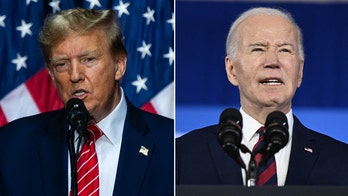
The Carl T. Hayden VA Medical Center in Phoenix is seen Wednesday May 28, 2014. (AP)
Congress, which hasn’t been able to do much of anything other than spin its wheels, may be on the verge of passing a law to deal with the VA debacle.
If you haven’t heard much about that, it’s because the media have largely lost interest.
The top negotiators, Sen. Bernie Sanders, the Vermont independent, and Rep. Jeff Miller, a Florida Republican, have struck a deal that would provide $17 billion to the department to hire more doctors and nurses and build new facilities, and to make it easier to fire bumbling officials. These agreements can always fall apart, especially with both houses racing to get out of town for the rest of the summer, but the compromise is there for the taking.
Remember when everyone in the media and political world was outraged at the VA mess? When the country was shocked that some vets were dying while waiting long periods to get medical care, a situation covered up with bogus waiting lists? When the drumbeat for Eric Shinseki’s head grew so loud that he finally had to go? When we were all convinced that this scandal was different because it had such a heart-rending human dimension involving people who had risked their lives for our country?
Now, not so much.
There is nothing quite like the adrenaline that courses through the media bloodstream like the fresh whiff of scandal. Front-page stories, live shots and cable debates dominate the news cycle. Every fresh tidbit of information is vacuumed up. The damage to the administration is assessed every hour or so amid a flurry of new polls. Partisans square off over the blame game: wasn’t this also a problem during the Bush administration? And a rising chorus demands that someone take the fall.
In the VA’s case, the scandal fever peaked when the White House finally eased out Shinseki as the department’s secretary, even though that did nothing to solve the problems of an overcrowded and dysfunctional system. The story quickly petered out after that.
Inevitably, other stories erupted and filled the news hole. The tens of thousands of kids flooding across the border. The war between Israel and Hamas. The shootdown of the jet over Ukraine, which yesterday prompted the president to announce tougher sanctions on Russia. The media only have so much bandwidth. So the VA began to seem like old news.
As someone who has covered the Hill, I can also tell you that chronicling legislation is a slog. There are procedural delays, committee votes, posturing, poison-pill amendments, conference committees, crumbling compromises—and in the end most bills never pass.
The Senate has already passed a reform bill, 93-3, but you could be forgiven for not knowing that, since it drew so little coverage.
Now it’s not like the deal between Sanders and Miller is being totally ignored. There are occasional updates on cable news (Fox interviewed Miller yesterday). The New York Times and Washington Post had routine legislative pieces Tuesday. Here's the Post:
“A sweeping proposal to revamp the Department of Veterans Affairs and the nation’s medical care for military veterans should have enough support to pass the House and Senate this week before lawmakers leave town for a summer recess,” according to the “lead negotiators.”
Politico ran an interesting look at how the deal came together:
“Just last week, talks appeared on the verge of collapse as the leaders of a conference committee — Sen. Bernie Sanders (I-Vt.) and Rep. Jeff Miller (R-Fla.) — publicly slugged it out over differences on how to pay for the bill. Miller said Sanders was hurling “grenades” at Republicans rather than negotiating while Sanders called the GOP’s behavior ‘sad.’
“Those barbs turned out to be more cathartic than detrimental.”
But where is the debate? Will this $17 billion ease the backlog? How long will that take? How is it being paid for? These are not questions that excite editors or executive producers. And for all the clamor over Shinseki, how many in the press cared that the Senate Tuesday confirmed Bob McDonald as his successor? (The NYT does have a man-in-the-news piece today.)
One interesting twist is that President Obama, having vowed to take action, appeared to remain on the sidelines as members of Congress dived into negotiations. Perhaps he felt that raising his profile would only have alienated the Republican side.
If Obama winds up signing a VA measure into law, the media will cover it—for a day. Then the issue will likely fade until the next scandal. For the only thing that interests news organizations less than congressional debate is doing the scut work of finding out whether a law is actually working.




